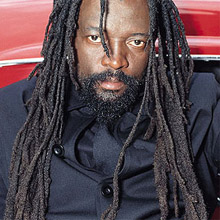October 27, 2007, 9:35 am
 The murder last week of South African reggae singer Lucky Dube has saddened and shocked many Jamaicans who had come to know and appreciate his music and its message of peace and goodwill.
Indeed, it is ironic that someone who sought, through his art, to promote the ideal of a world without violent conflict was cut down in such a brutal and callous manner.
Lucky Dube, news reports tell us, was shot dead by carjackers last Thursday night in front of his son and daughter, aged 15 and 16 respectively, when he dropped them off at their uncle's home in Rosettenville, a suburb in southern Johannesburg.
News of his murder has triggered outrage in the entertainment industry, and particularly in countries where Mr Dube performed, including Jamaica.
The murder last week of South African reggae singer Lucky Dube has saddened and shocked many Jamaicans who had come to know and appreciate his music and its message of peace and goodwill.
Indeed, it is ironic that someone who sought, through his art, to promote the ideal of a world without violent conflict was cut down in such a brutal and callous manner.
Lucky Dube, news reports tell us, was shot dead by carjackers last Thursday night in front of his son and daughter, aged 15 and 16 respectively, when he dropped them off at their uncle's home in Rosettenville, a suburb in southern Johannesburg.
News of his murder has triggered outrage in the entertainment industry, and particularly in countries where Mr Dube performed, including Jamaica.
This week's Sunday Observer reported the expressions of a number of people in the local music industry, most of whom spoke highly of the quality of his music and the fact that he drew inspiration from our very own Peter Tosh, who himself was murdered by gunmen at his home in Barbican, St Andrew in September 1987.
At that time, people the world over expressed shock and outrage at Peter Tosh's murder, which stained Jamaica's image and highlighted our nagging problem of crime. Much the same has now happened to South Africa, as the international media have focused their attention on what some have termed the "ever-worsening" crime situation gripping that African nation. Indeed, President Thabo Mbeki's Government has come under fresh attacks from critics who accuse the administration of failing to fulfil its promise to bring crime under control. Even the Congress of South African Trade Unions (Cosatu), a traditionally strong ally of the ruling African National Congress (ANC), is reported to have said that it was appalled and outraged at Lucky Dube's murder and called on the Government for solutions to crime.
It's no easy task, as South Africa, with its population of 47.9 million people, has just under 20,000 murders per year, according to statistics from the South African Police Service. That's just over 50 murders a day - a frightening prospect for any investor and enough to make business owners and law-abiding South Africans concerned. That scenario is one to which we in Jamaica can relate, as we struggle with our own very high crime rate and the disincentive that it presents to potential investors. But societies that wish to improve their standard of living cannot yield to the few mindless barbarians who are intent on sowing mayhem at will.
For giving in to thugs would open the floodgates for lawlessness and the ultimate breakdown of society. We are not here suggesting that President Mbeki should become a despot like his neighbour, President Robert Mugabe in Zimbabwe, and start cracking skulls. Mr Mbeki, even as he confronts his own problem of an approval rating slump, needs to help shape the kind of South Africa that will be safe for its people and their guests; the kind of South Africa that will produce more citizens of the ilk of Mr Lucky Dube who, though born poor, did not end up living a life of crime. The same can easily be said of the Jamaican Government who, while still fresh in office, needs to move quickly to address the grave social and economic problems we face in this country.
